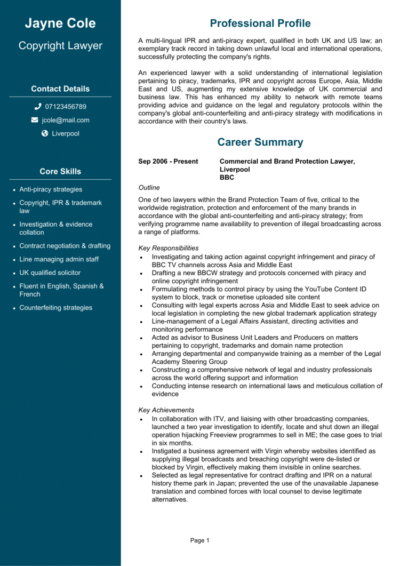Are you ready to present your case to a recruiter and win the role you deserve?
Whether you’re aiming for a position as a legal assistant, paralegal, or lawyer, your CV needs to demonstrate your expertise, attention to detail, and ability to navigate the complexities of the legal field.
This guide, complete with Legal CV examples, will help you craft a CV that showcases your qualifications, skills, and accomplishments to secure your next opportunity in the legal profession.
Lawyer CV example
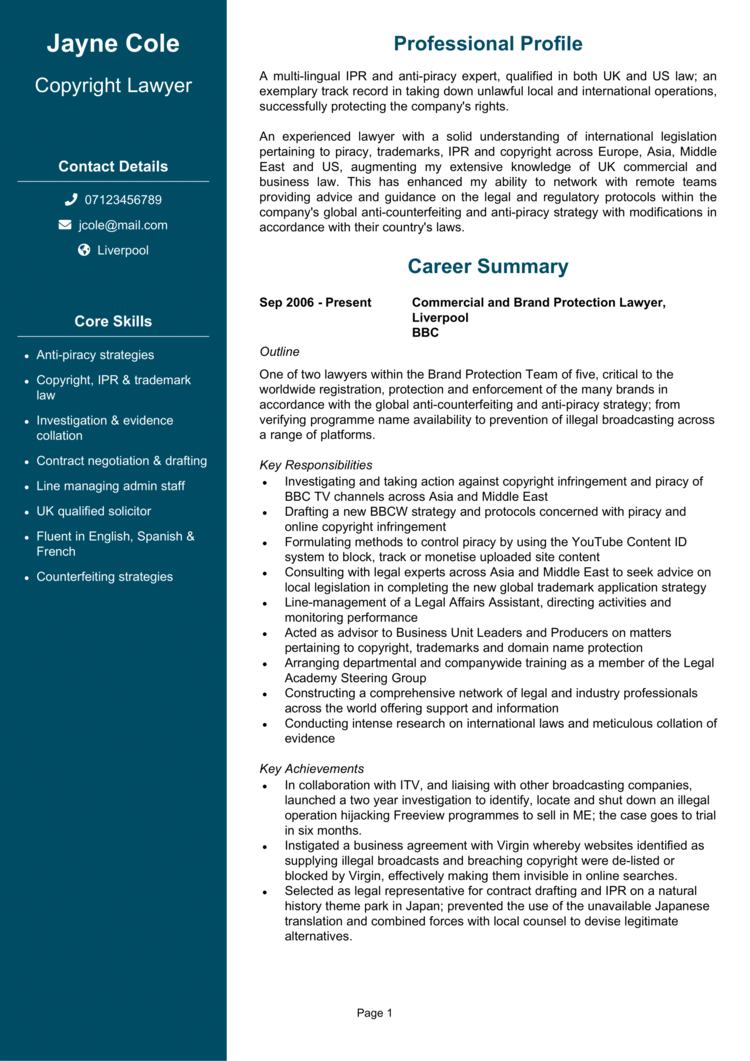
Paralegal CV example

Solicitor CV example
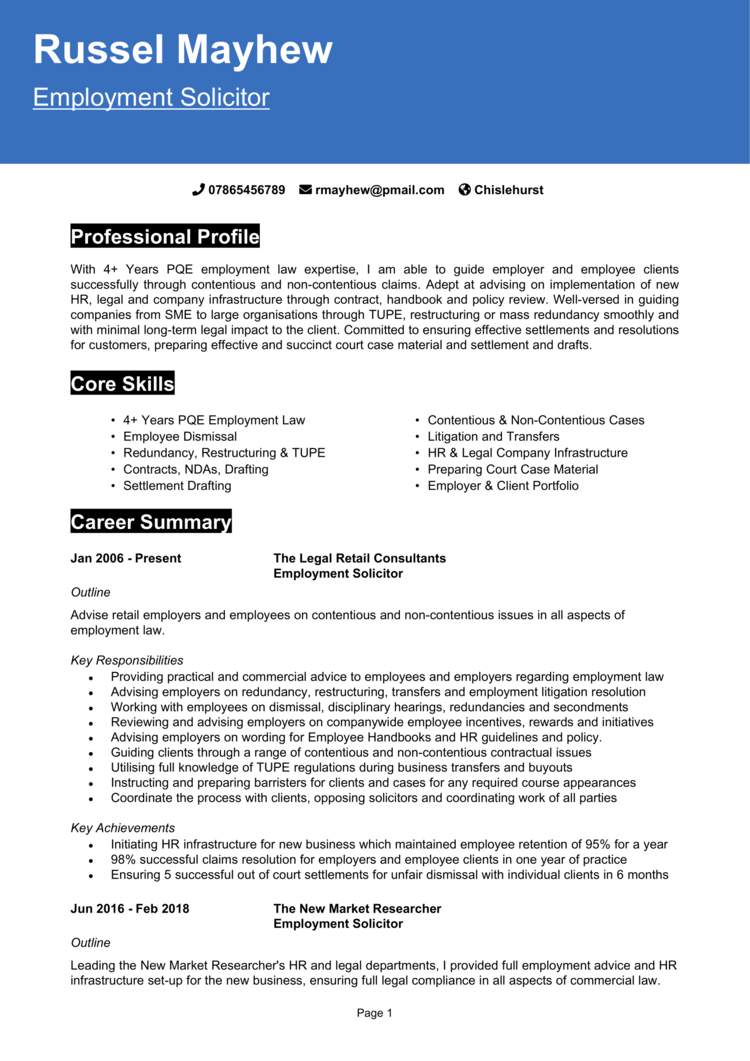
Legal Assistant CV example
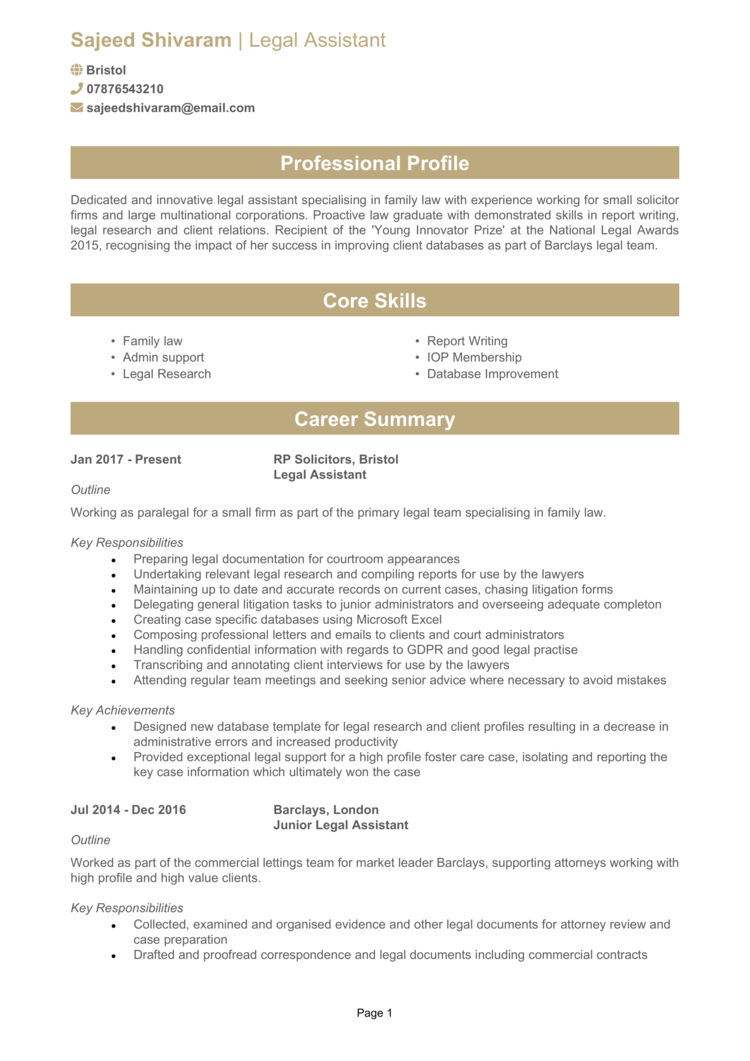
Trainee Solicitor CV example
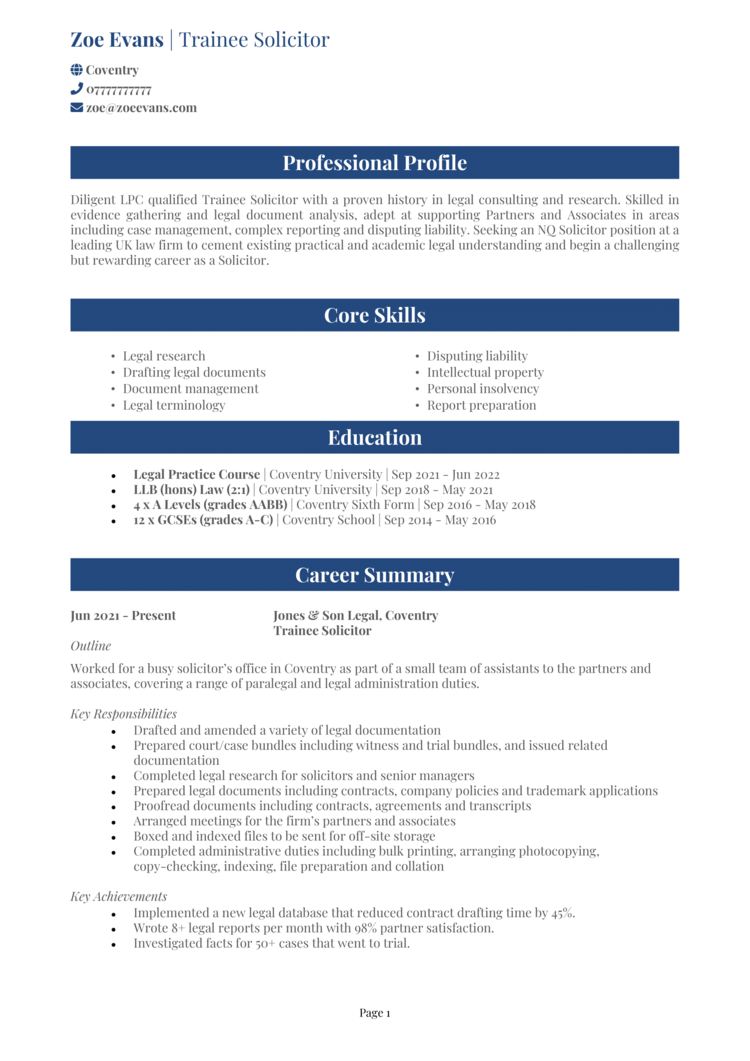
Legal Advisor CV example
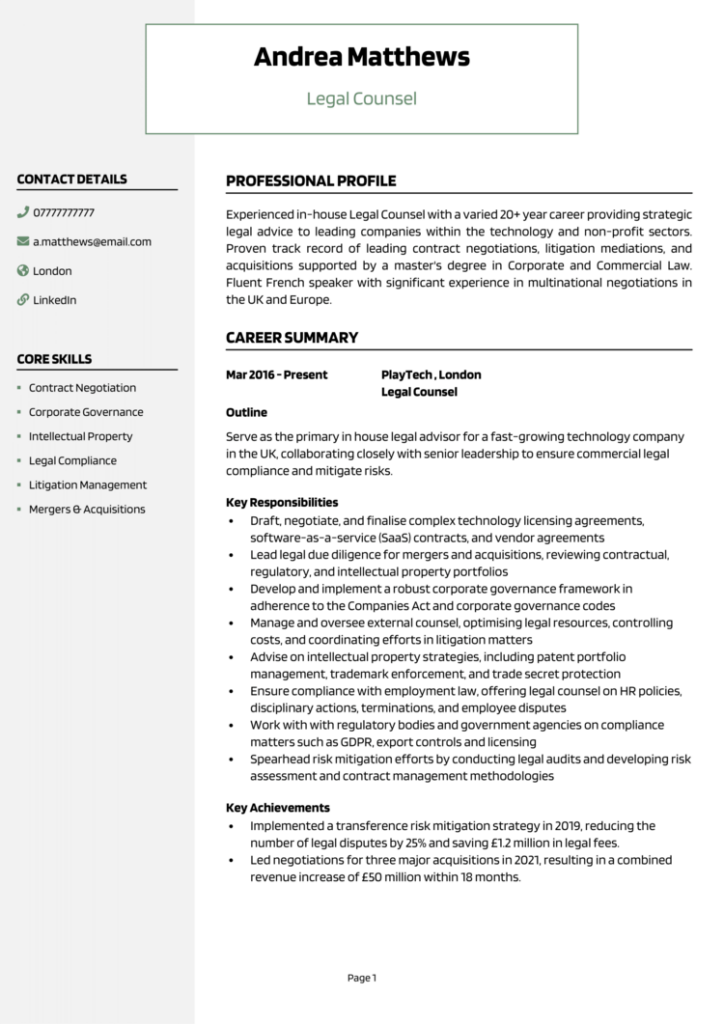
Legal Consultant CV example

Legal Executive CV example
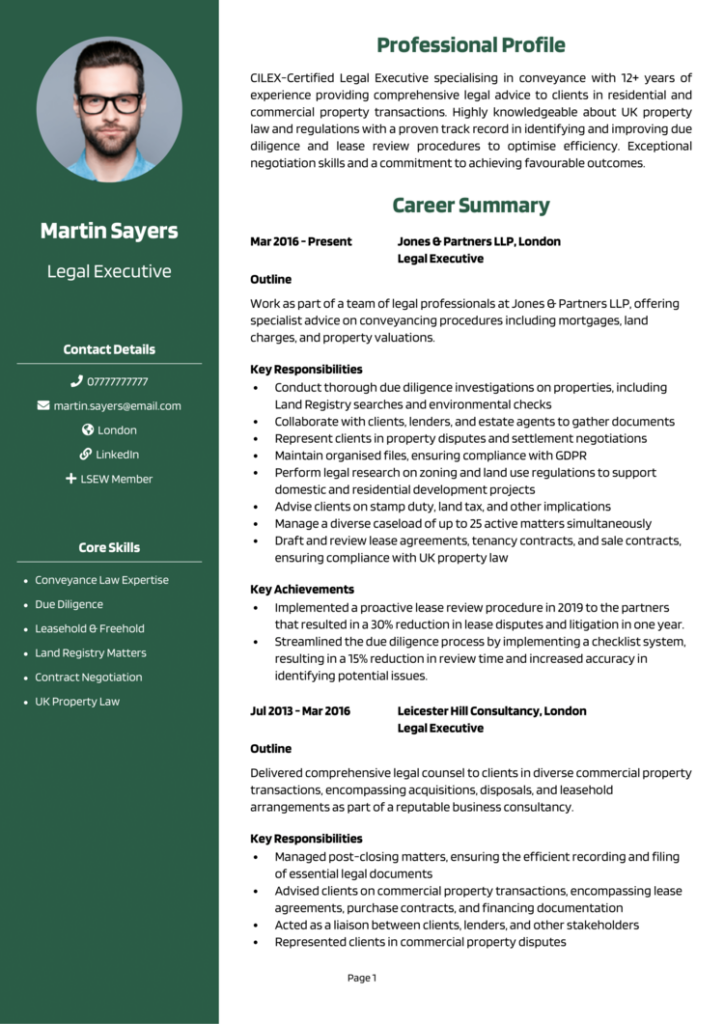
How to write your Legal CV
Learn how to create your own interview-winning Legal CV with this simple step-by-step guide.
From organising your key qualifications to showcasing your expertise in legal research or client advocacy, this guide will ensure your CV is as polished as the contracts you draft. You’ll learn all there is to writing an application that lands you interviews for top legal roles.
Legal CV structure


A Legal CV needs a structure as clear and logical as a well-drafted contract. Recruiters need to quickly see your qualifications, skills, and experience, so a polished layout is essential.
Here’s how to structure your Legal CV:
- Name and contact details – Place personal details at the top so potential employers can reach you easily. Including a photo is entirely optional.
- Profile – Open with a summary your legal expertise, notable achievements, and career goals.
- Core skills – Let the recruiter know your strengths, such as contract drafting, legal research, and client relations, with a few brief bullet points.
- Work experience – Walk through your past roles in reverse chronological order, focusing on your contributions and accomplishments.
- Education – Mention your academic history, outlining the qualifications, legal training, and certifications which underpin your expertise.
- Additional info – Optionally, mention hobbies and interests, professional memberships, or community involvement that supports your legal ambitions.
The correct format for a Legal CV


Your CV should reflect the professionalism and precision you bring to legal work. Even a top lawyer would have trouble defending poor formatting – make sure your CV is easy to read and free of rookie mistakes that detract from your expertise.
Here’s how to format your Legal CV:
- Bullet points – Make your experience and skills easy for the reader to skim.
- Divide sections – Use clear headings to guide recruiters through your CV.
- Use a clean font – Choose a simple, professional font with consistent formatting.
- Keep it the right length – Keep your CV under 2 pages – concise, while covering every key detail.
Writing a Legal CV profile


Your CV profile is your opening argument – it needs to be clear, compelling, and leave no room for objections. For a legal role, this is your chance to highlight your specialisations and legal expertise.
Legal CV profile examples
Profile 1
Experienced Lawyer with over six years of expertise in corporate law, specialising in mergers and acquisitions, compliance, and contract negotiation. Adept at providing strategic legal advice to multinational clients and drafting detailed agreements. Skilled in using legal research tools such as LexisNexis and Westlaw.
Profile 2
Organised Paralegal with four years of experience in civil litigation, focusing on case preparation, document management, and client communication. Skilled in drafting legal documents, conducting research, and ensuring compliance with court procedures. Proficient in using Clio and Relativity for case management.
Profile 3
Reliable Legal Secretary with five years of experience supporting solicitors in family law practices. Skilled in scheduling appointments, managing legal correspondence, and preparing court documents. Experienced in using Microsoft Office Suite and legal software like PracticePanther to streamline administrative tasks.
What to include in your Legal CV profile
Here are some tips to make your profile as persuasive as a courtroom argument:
- Where you’ve worked – Mention law firms, in-house legal departments, or other organisations where you’ve gained experience.
- Your top qualifications – Highlight legal degrees, professional memberships, or certifications such as the LPC or SQE.
- Essential skills – Include key strengths like legal research, case preparation, or client advocacy.
- Areas of law you’ve specialised in – Mention expertise in fields like corporate law, family law, or intellectual property.
- Notable cases or clients – If appropriate, reference your involvement in high-profile cases or key client relationships.
Core skills section


Your core skills section is a summary of your legal expertise, giving recruiters a quick overview of your capabilities.
For legal professionals, this might include drafting skills, negotiation abilities, or proficiency with case management software.
Tailor these to the role, just as you’d tailor your argument to a specific case. After all, a corporate lawyer’s skills will look very different from a criminal defence attorney’s.
Not sure how to write a professional legal CV?
With our CV builder, you’ll get structured templates, legal-specific content, and expert advice to craft a polished and persuasive application.
Top skills for your Legal CV
- Legal Research – Conducting thorough research to support case strategies and ensure compliance.
- Contract Drafting – Preparing contracts, agreements, and other legal documents with precision.
- Case Management – Organising and managing legal cases from initial consultation to resolution.
- Client Relations – Building strong relationships with clients to understand and address their legal needs.
- Litigation Support – Assisting with trial preparation, evidence gathering, and courtroom procedures.
- Document Review – Analysing contracts and legal documents to identify risks and ensure accuracy.
- Negotiation – Mediating disputes and negotiating agreements to achieve favourable outcomes.
- Regulatory Compliance – Ensuring adherence to local, national, and international legal standards.
- Technology Proficiency – Using legal software like Clio, LexisNexis, or Westlaw for research and case management.
- Specialised Knowledge – Expertise in specific areas such as employment law, tax law, or intellectual property.
Work experience


Think of the work experience section as the evidence that supports your case. The recruiter wants to see what you’ve done, how you’ve done it, and the results you’ve delivered.
List your roles in reverse chronological order, focusing on accomplishments that showcase your skills and specialisations.
If you’re just starting out, highlight internships, moot court victories, or even that time you helped your roommate get their deposit back.
How to format previous jobs in your CV correctly

- Outline – Provide an overview of the organisation, your role, and the type of legal work you managed.
- Responsibilities – Highlight key tasks like drafting contracts, managing cases, or conducting legal research. Use action verbs like “advised,” “represented,” or “drafted.”
- Achievements – Showcase measurable results, such as successful litigation outcomes, cost savings, or client satisfaction. Include numbers and figures where possible to make your impact clear.
Example job entries for Legal roles
Lawyer | Lexis Corporate Solutions
Outline
Advised multinational corporations on mergers and acquisitions, ensuring compliance with corporate laws and regulations. Drafted and reviewed legal documents, providing strategic counsel to clients.
Responsibilities
- Drafted, negotiated, and reviewed contracts, including NDAs and shareholder agreements.
- Conducted due diligence for mergers and acquisitions, identifying risks and liabilities.
- Provided legal advice to clients on regulatory compliance and corporate governance.
- Represented clients in negotiations and liaised with external counsel as needed.
- Kept up-to-date with changes in corporate law and industry regulations.
Achievements
- Closed £50M+ in M&A deals within one year, ensuring client objectives were met.
- Reduced client legal risks by 25% through detailed compliance reviews.
- Developed a client training programme on corporate governance, boosting retention rates by 15%.
Paralegal | Civic Justice Partners
Outline
Supported solicitors in civil litigation cases by conducting research, preparing case files, and ensuring timely submission of documents. Played a key role in maintaining efficient case management.
Responsibilities
- Prepared legal documents, including pleadings, motions, and discovery responses.
- Conducted legal research on case law and statutes using Westlaw and LexisNexis.
- Maintained and organised case files, ensuring accuracy and accessibility.
- Liaised with clients and third parties to collect necessary documentation.
- Scheduled hearings, depositions, and meetings for solicitors.
Achievements
- Reduced document processing time by 20% through streamlined filing practices.
- Contributed to the successful resolution of 80+ cases within two years.
- Recognised for maintaining a 100% error-free record in document preparation.
Legal Secretary | Haven Family Law
Outline
Provided administrative support to solicitors in a family law firm, ensuring smooth daily operations and efficient management of legal correspondence.
Responsibilities
- Prepared and formatted legal documents, including affidavits and court applications.
- Managed solicitors’ calendars, scheduling client appointments and court appearances.
- Handled incoming calls and correspondence, providing excellent client service.
- Filed legal documents with the court, ensuring adherence to deadlines and procedures.
- Maintained confidentiality and ensured compliance with GDPR regulations.
Achievements
- Reduced scheduling conflicts by 25% through improved calendar management.
- Improved client satisfaction ratings by ensuring prompt and professional responses.
- Developed a filing system that reduced document retrieval time by 30%.
How to list your educational history


Your education section is where you list the ‘legal precedents’ of your career – that all-important academic training and qualifications that paved the way for your achievements. Include your law degree, postgraduate legal training, and any certifications relevant to the role.
This section is typically brief but impactful. List your qualifications in reverse chronological order, starting with the most recent.
Best qualifications for Legal roles
- Law Degree (LLB) – A foundational degree covering legal principles, case law, and regulatory frameworks.
- Legal Practice Course (LPC) – Postgraduate training for solicitors, focusing on practical legal skills.
- Solicitors Qualifying Examination (SQE) – A new route to qualifying as a solicitor in England and Wales.
- Bar Professional Training Course (BPTC) – Required for aspiring barristers, covering courtroom advocacy and case preparation.
- Master of Laws (LLM) – Advanced legal training in specialised fields such as international law or corporate law.


